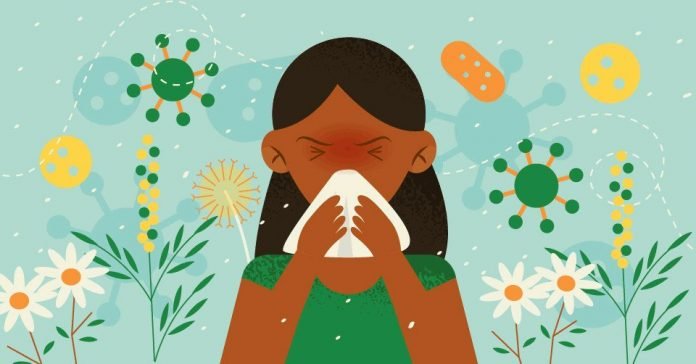Last Updated on July 18, 2024 by Asfa Rasheed
Hay fever, also known as seasonal allergic rhinitis, can be a miserable experience — sneezing, itching, and runny nose. You may have an idea what causes hay fever, but if you’re like most people you probably don’t know how to manage the symptoms effectively.
Hay fever is an allergic reaction triggered by airborne allergens. During hay fever season, outdoor allergens like pollen can cause your symptoms. Indoor allergens like animal dander, dust mites, and mold spores can also trigger your symptoms during other times of the year. It may cause you to experience sneezing, itching, a runny nose, and a cough. It can be treated by learning how to manage your symptoms at home.
Hay fever usually hits during spring or early summer and lasts till the end of fall, depending on where you live. There are many ways to deal with it — from home remedies to over-the-counter drugs — but you can also visit your doctor if hay fever symptoms get severe and debilitating. This article will provide tips on how to deal with hay fever when it hits during allergy season.
Table of Contents
Hay Fever vs. Cold
Hay fever symptoms are different from those of a common cold. Most people who have hay fever experience sneezing, itchy eyes, and a runny nose during their allergy season while a common cold usually does not cause these symptoms. Also, hay fever sufferers will usually only suffer for about two months each year whereas some cold sufferers can develop chronic sinus problems that could last for several years.
Symptoms of Hay Fever
At first, symptoms will appear as a runny nose and sneezing. If untreated, hay fever can cause more severe symptoms such as coughing, a blocked nose, and itchy eyes. Antihistamines treat hay fever by blocking histamine, which helps reduce swelling in the mucous membranes that line your sinuses and lungs. If you want relief from these uncomfortable symptoms of hay fever, there are plenty of things you can do.
Treatments for Hay Fever
Hay fever is particularly problematic for people who are allergic to grass pollen. Hay fever generally responds well to medication in its early stages. The most effective hay fever treatment includes avoidance of allergens and antihistamines taken before symptoms begin. They reduce itching, sneezing, watery eyes, nasal congestion, and a runny nose.
If you have chronic allergies that don’t respond to medicines or other treatments, your doctor may refer you to a wellness center that offers allergy treatment services such as therapeutic treatments Also, it’s important to note that if your allergies aren’t severe enough to need daily medications, there isn’t yet strong evidence showing that using over-the-counter allergy medications will prevent allergic reactions from happening. Your best bet in case of mild seasonal allergies is to simply use wipes or sprays containing saline solution regularly as preventive measures, wash hands frequently, and wear sunglasses outside at all times during high pollen seasons.
Research shows that nasal rinses and decongestants can offer relief if used on a short-term basis, but should not be used regularly because they can cause rebound congestion when stopped. During allergy season, over-the-counter medicine can relieve common allergy symptoms such as headaches, colds, or sinusitis.
Putting turmeric in your food can also help. Turmeric is an antioxidant-rich herb with anti-inflammatory properties that can help ease allergy symptoms. Taking vitamin C and fish oil is also recommended. Research shows that taking these supplements can improve allergy symptoms by reducing inflammation.
Tips to Cope
While it might be impossible to completely escape pollen, there are ways you can cope. A few tips include:
- Make sure your bedroom is well-ventilated
- Use a high-quality air filter
- Wash clothes in hot water during the laundry
- You can also use air purifiers or filters that remove allergens and pollutants
- Keep windows closed as much as possible to reduce exposure
If hay fever symptoms start getting worse or interfering with daily life, see a doctor — there may be additional measures you can take.
Other Irritants That Can Make It Worse
Even cigarette smoke or perfume can irritate your eyes and nasal passages. Wood smoke from a fireplace, paint fumes from remodeling, carpeting, drapes, and even wallpaper may be causing you more problems than you realize. These irritants are common airborne allergens because they are easily inhaled into your nose and lungs. The best way to deal with them is to get rid of them at home to reduce symptoms.
Refrain from using aerosol sprays. These contain chemicals that can aggravate your allergies. If you use them, try natural brands or, better yet, don’t use them at all. Avoid fragrances in detergents and personal care products like soap and shampoo.
If your hay fever is making you miserable, it’s time for action. Treatments do exist, and there are many ways you can feel better. What does seem clear is that those who suffer from seasonal allergies should avoid triggers whenever possible, and be ready to treat a flare-up as soon as it occurs. Whether any of these methods work for you, treating your allergies responsibly will at least help you get some relief from misery.
Read more: The Different Types of Dental Treatments That Are Offered Today.













